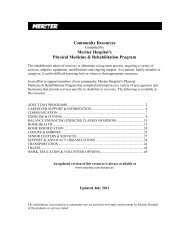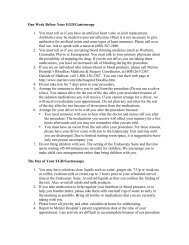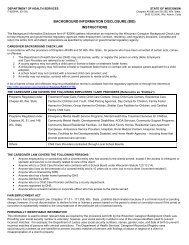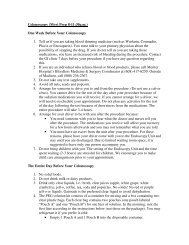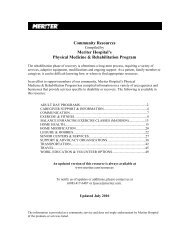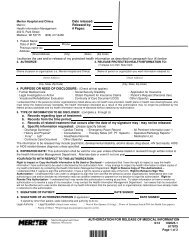A Guide To Your New Family's First Weeks - Meriter Health Services
A Guide To Your New Family's First Weeks - Meriter Health Services
A Guide To Your New Family's First Weeks - Meriter Health Services
Create successful ePaper yourself
Turn your PDF publications into a flip-book with our unique Google optimized e-Paper software.
Why And When Do Babies Cry<br />
Crying is one way that newborns communicate<br />
their need for attention. <strong>New</strong>borns cry an average<br />
of one to three hours per day. Most of the crying<br />
is associated with a need to communicate hunger,<br />
although crying is a late hunger cue. By responding<br />
early to feeding cues, you can help reduce the amount<br />
of crying in newborns (see page 24). Since babies<br />
are hungry at least every two to four hours, delayed<br />
response can result in increased crying.<br />
By the second or third week, babies<br />
begin to have periods when they are<br />
awake and fussy. This is often mistaken<br />
for hunger, but you may find that<br />
offering food does not interest your<br />
baby. Offering your baby a pacifier or<br />
thumb for non-feeding sucking may calm him down.<br />
<strong>Your</strong> baby’s fussy periods may become predictable.<br />
It is common for babies to be fussy in the late<br />
afternoon and evening. This is often a result of<br />
missed feeding cues. Babies often need to cluster<br />
feed during those times. The fussy period peaks at<br />
about six weeks old but may last up to three months.<br />
The Unusually Fussy Baby<br />
Normal babies can create unusual levels of anxiety<br />
or frustration in a family through long periods of<br />
crying. They are not constantly fussy like the “colicky<br />
baby” who is inconsolably fussy for much of the day.<br />
There is often no identifiable cause for this behavior.<br />
Some babies seem to be extraordinarily sensitive to<br />
their entire environment. They overreact to hunger,<br />
wetness, heat, cold, too much noise and even too<br />
much handling. Special techniques are required in<br />
such cases, but first you must be assured that this is<br />
not a cry of pain or illness. A discussion with your<br />
health care provider may help.<br />
The Crying Baby<br />
A baby’s cry is a way of controlling his environment, and represents a call for help. Studies show that responding early<br />
to a crying infant eventually reduces total crying time. Trust your intuition. If your baby’s crying is of unusual length<br />
or intensity, or if you are concerned the fussiness is due to illness, contact your baby’s doctor.<br />
An unsettled, fussy baby who cries inconsolably despite parents’ efforts to help can be frustrating. We offer these tips<br />
to help, yet sometimes there is no “cure.”<br />
“All babies are good<br />
babies, some are just a<br />
little easier to live with<br />
than others.”<br />
The Baby With Colic<br />
The truly colicky baby creates an especially stressful,<br />
but temporary, situation. These babies are unhappy<br />
“around-the-clock” day after day. A colicky baby’s<br />
entire body is tense. Often he pulls his legs toward<br />
his belly, clenches his fists and has a look of agony<br />
on his face. The crying is often very high pitched. If<br />
nothing seems to give your baby comfort, call your<br />
baby’s doctor to seek advice.<br />
Tips <strong>To</strong> Help Settle A Fussy<br />
Baby<br />
<strong>First</strong>, check to see if your baby is<br />
hungry, has a soiled diaper, or needs a<br />
position change.<br />
Other Suggestions:<br />
• Place your baby skin-to-skin (see page 12). This<br />
contact with your body, so that she can feel your<br />
warmth, heartbeat and breathing, is often enough<br />
to calm your baby.<br />
• Swaddle him in a light blanket.<br />
• Try burping. Babies swallow air after long periods<br />
of crying. Burping relieves the ache.<br />
• Stroking, patting or massaging can be soothing.<br />
• Try soft music, swings, rockers, fans or walking<br />
with the baby.<br />
• If crying is due to over stimulation, reduce<br />
stimulation by darkening the room, turning off<br />
the TV or radio and setting your baby down.<br />
Sometimes white noise, like the sound of a fan<br />
or vacuum cleaner, a swooshing sound with<br />
your voice or a radio station with static will help<br />
re-center your baby.<br />
• Use a baby sling. It can provide comfort while<br />
leaving your arms free to do other things.<br />
• Offer a warm bath.<br />
47




